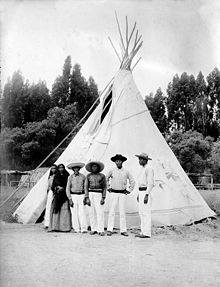Yaqui

Yaqui Indians
|
|
| Regions with significant populations | |
|---|---|
|
|
11,324 |
|
|
14,162 |
| Languages | |
| Yaqui, English, Spanish | |
| Religion | |
| Indigenous Religion, Peyotism, Christianity, Roman Catholic | |
| Related ethnic groups | |
| Mayo Uto-Aztecan people | |
The Yaqui or Yoeme are Native Americans who inhabit the valley of the Río Yaqui in the Mexican state of Sonora and the Southwestern United States. They also have small settlements in Sinaloa, Chihuahua, and Durango. The Pascua Yaqui Tribe is based in Tucson, Arizona. Yaqui people also live elsewhere in the southwestern United States, especially Nevada and California.
The Yaqui language belongs to the Uto-Aztecan language family. Yaqui speak a Cahitan language, a group of about 10 mutually-intelligible languages formerly spoken in much of the states of Sonora and Sinaloa. Most of the Cahitan languages are extinct. Only the Yaqui and Mayo still speak their language. About 15,000 Yaqui speakers live in Mexico and 1,000 in the U.S.A, mostly Arizona.
The Yaqui call themselves Hiaki or Yoeme, the Yaqui word for person (yoemem or yo'emem meaning "people"). The Yaqui call their homeland Hiakim, from which some say the name "Yaqui" is derived. They may also describe themselves as Hiaki Nation or Pascua Hiaki, meaning "The Easter People", as most had converted to Catholicism under Jesuit influence in colonial Mexico. Many folk etymologies account for how the Yoeme came to be known as the "Yaqui".
When the Spanish first came into contact with the Yaqui in 1533, they occupied a territory along the lower course of the Yaqui River. They were estimated to number 30,000 people living in 80 rancherias (Yaqui villages) in an area about 60 miles (100 km) long and 15 miles (25 km) wide. Some Yaqui lived near the mouth of the river and were dependent upon the sea for subsistence. Most lived in agricultural communities, growing beans, maize, and squash on land inundated by the river every year. A few lived a nomadic existence in the deserts and mountains and depended upon hunting and gathering.
...
Wikipedia
